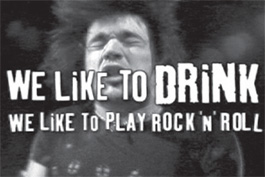home | metro santa cruz index | movies | current reviews | film review

'The Tripper': Talk about a bad trip. When these teenagers go for a decadent, drug-plentiful romp in the Santa Cruz woods, they meet a deranged killer intent on ruining their fun.
Film, Music and Cultural Ambiguity
The Santa Cruz Film Festival explores both film and music's ability to transcend barriers and create community
By Steve Hahn
Music has a way of cropping up even in the most unexpected of places. Downtrodden and depressed people are just as likely as the rich and leisurely to pick up whatever they can and blow, bang or strum it, if not more so. One need only look at the history of the United States, in which slaves, despite being given only enough resources to survive, work and reproduce, laid the foundation for most original music developed in the country.
This universal nature of music, and the way different styles interact, break down barriers and form new sounds, will be a theme interwoven throughout many of the films in this year's Santa Cruz Film Festival, running April 19-28.
The ability of music to transcend cultural and political boundaries both within the United States and across the globe is hinted at by films such as Cuban Hip-Hop, a documentary focusing on the poor urban youth of Cuba who have integrated an art form from a country they're supposed to despise into their daily lives. The film traces the hip-hop movement from its humble beginnings in the 1980s to its thriving culture today and highlights how hip-hop speaks to the common struggles, desires and fears shared by young people of politically opposed nations.
Cuban Hip-Hop will be joined by films such as Illmanya, which tells of an American performance troupe that traveled to Guinea to learn and bring back to rural America the country's rich tradition in music and dance, in showing music's power to create a common dialogue outside national identities.
Melting Pot
Perhaps nowhere is this "melting pot" of music, dance and culture more profound than in the city of Fez, Morocco, which hosts an annual festival that brings reality to William Burroughs' mythical Interzone (a city from Naked Lunch that incorporated all of the world's cultures into a single African city). The film Sound of the Soul explores the history of Fez, a meeting place of Christian and Islamic empires as well as the Jewish diaspora. In Fez, people from all these religions had to learn to live with each other, and no doubt the various forms of dance and music the inhabitants shared provided a communal space that was too strong (and fun!) for their religious differences to interfere with.
The annual festival in Fez, started 12 years ago, brings musicians from Europe, Harlem, Afghanistan and Africa together to share their musical and spiritual traditions. As in many of the films at this year's festival, the commonalities between these traditions and the new art forms that can be created by blending the old traditions is stressed over the myth of irreconcilable differences between cultures.
The power of music and dance to break through cultural barriers set up within nations runs through this year's selections as well. Vanaja tells the story of a young girl in India who must prove herself to an experienced dancer from a higher social caste in order to learn from her and break the bonds of social hierarchy that would otherwise condemn her to a fate of lifelong servitude. Again the message of music and dance as a language that creates a more profound connection and identity than restrictive social classifications is strong.

'Indies Under Fire': This documentary uses the local examples of Bookshop Santa Cruz and Capitola Book Café to draw attention to the pressures facing independent booksellers
Dharma Punk
The trade in musical and spiritual traditions is not limited to far away, exotic locations, however. It is all around us, especially here in California. Santa Cruz local Noah Levine was raised on the all-American diet of punk rock, violence and drugs, but soon found deeper meaning by incorporating Buddhist practices into his daily life. The film Meditate and Destroy follows Levine's struggle to find balance between the punk-rock lifestyle he still loves and the new sense of spirituality that curbs some of the more dangerous tendencies of his hard rockin' life.
This film provides another example of the benefits of having multiple "ways of being" available to individuals within a culture. Levine uses his newfound sense of inner peace and purpose to help young prisoners in Juvenile Hall find a new way of living before it's too late.
Along with these films exploring cross-cultural trade, there are a slew of films exploring the process of music itself, how it is created despite (or because of) hardship, and how it refuses to be silenced even under intense pressure from the outside world.
In China, music was once the purview of the centralized Communist leadership. The national orchestras were funded and run by the government. A Farewell Song explores what happened when that government support was cut off and the musicians were forced to fend for themselves. An inspirational story of the sacrifices musicians are willing to endure for their art, this film allows viewers to peek into the crème de la crème of Chinese classical music and its persistence outside official channels.
Perhaps throwing even more light onto the unquenchable drive musicians have to express themselves through sound, the film Jamesie, King of Scratch documents the history of the indigenous folk music that grew out of the Virgin Islands culture. In one scene, the camera follows 79-year-old James Brewster, the film's "protagonist," as he makes his instruments from materials he finds lying around his home: a sardine can and white pine lumber. The film highlights not only the inventiveness of the musicians on the islands, but also the function music plays in the community as a medium of storytelling and way of coping with the poverty that surrounds them.
OK, so the sociopolitical implications of music may be all well and fine, but sometimes you just have an indescribable need to rock out, so for all the head bangers out there, don't worry, the festival has not forgotten you. We Like to Drink: We Like to Play Rock And Roll tells the story of the über-ironically named "Unband" (see sidebar) and their over-the-top lifestyles filled with decadence and loud music. Featuring a naked drummer, in-your-face power chords and devil-may-care punk-rock lyrics, this film should leave no one in the audience sitting down.
The War at Home
The festival also features films that step outside the musical theme and address contentious local issues. Santa Cruz prides itself on its many local business owners, who give a unique and intimate alternative to homogenous big-box stores governed by rigid codes of conduct. In a college town with an educated populace, the bookstore is an especially popular spot and there is no shortage of independent retailers offering their literary products to the market.
Yet Santa Cruz may be lucky in this regard, as the film Indies Under Fire illustrates. The filmmakers report that more than half of the nation's independent bookstores have folded in the last 10 years, and that even local favorites such as Bookshop Santa Cruz and the Capitola Book Café have faced threats from larger, out-of-town competitors. The film chronicles how these independent retailers had to adapt to fit the new realities of corporate competition and features our very own county supervisor and bookshop owner Neal Coonerty.
Another film of interest to local culture junkies is Downtown Locals, which admittedly is about New York--not Santa Cruz--street performers, but still radiates in this town that embraces all forms of artistic expression, especially the absurd. If Umbrella Man thinks his slow walking is a revolution in the world of performance art, he may have something to learn from one of the film's six subjects known as Mercury Man, who stands completely motionless for hours on end.
The filmmakers look past the surface of these performances and explore the lives of the performers themselves as they struggle to express their ideas while surviving the relatively tough streets of New York. As if to accent the local parallel, the Great Morgani will perform following the showing.
The stories of street performers will not be limited to New York, however. A closer look will also be focused on one of Santa Cruz's more talented street performers, Kevin Masaya Kmetz, who can often be seen on Pacific wailing away on his shamisen with amazing agility and precision.
A blind musician known as Nitabo living in Japan during the 19th century originally utilized the three-stringed shamisen to create a new musical form that was passed along from generation to generation. But variation was built into the musical form, as students were encouraged to "play their own style." When Kmetz came back to California from his travels in Japan he took this advice and created his own style, California Shamisen, which is also the film's title. Kmetz plans to be in town for the film's showing and will even play a piece at the Cayuga Vault after the showing.
With these films documenting tales of local legends and stories that demonstrate the power of music, there should be plenty to please the mental palate in this sixth annual Santa Cruz film festival.
The Sixth Annual Santa Cruz Film Festival runs April 19-28. Check insert for film times and locations or visit www.santacruzfilmfestival.com.
The Unband's Musical Lubricant
When I was in high school I went to a punk rock show where the lead singer chugged from a seemingly endless supply of Coors. After he was done draining each aluminum can, he would smash it against his head, resulting in a stream of blood flowing down his head. This, I remember thinking, was rock in its purest essence.

I was so naive back then. The nameless bozo I saw that night was small fries next to the Unband, who will be featured in all their drunken glory at the Santa Cruz Film Festival in next week's screening of We Like to Drink; We Like to Play Rock and Roll.
While the Unband, whose constant partying no doubt helped play into the rambunctious energy of their live shows, have since broken up, their bassist Mike Ruffino will bring the wild and inebriated style that made his old band a cult favorite to Cafe Mare following the film's screening on April 26.
Cafe Mare is not the first venue that pops into mind for a rock concert, but according to Lexie Shabel, who directed the film and traveled with the band on their Canadian tour, members of the Unband rock hard wherever they find themselves.
"They could rock a stadium and then they could play a bar of 15 and they'd still be playing it like it was a stadium of 10,000," she says. "They always had a way of looking out into the masses and posturing."
The Unband members learned to play their instruments together when they were in high school and, according to Shabel, they were one of the first bands in the last couple of decades to smoothly combine on-point musicianship with a fun, spontaneous approach to their art and life.
"What's fascinating about the Unband is that when this film was made and when the Unband was around, there were no bands like them," she says. "There was no White Stripes, no Strokes, or Hives; none of those bands were happening. The only type of rock you got was this aggro stuff like Rage Against the Machine."
Shabel is excited to be bringing one-third of the Unband to a new corner of the country, and she knows that Ruffino will show up ready to rock the punk-influenced, power-chord tunes he's known for. Yet, she admits that in this case the whole would have been greater than the sum of its parts.
"I insist the Beatles could have existed without George Harrison and Ringo," she states boldly. "But the Unband could not exist without one member."
Nevertheless, Shabel promises this won't detract from the experience of seeing one member of a "dying breed" of rockers who push their music, and their drug consumption, to the limit.
"The joke was that even a bad show was a good show," Shabel says. "There were shows where Matt's guitar strings would break and he'd go get a trash can or a kazoo and start rockin' on that. They were just able to rock anything!"
Steve Hahn
Send a letter to the editor about this story.
|
|
|
|
|
|